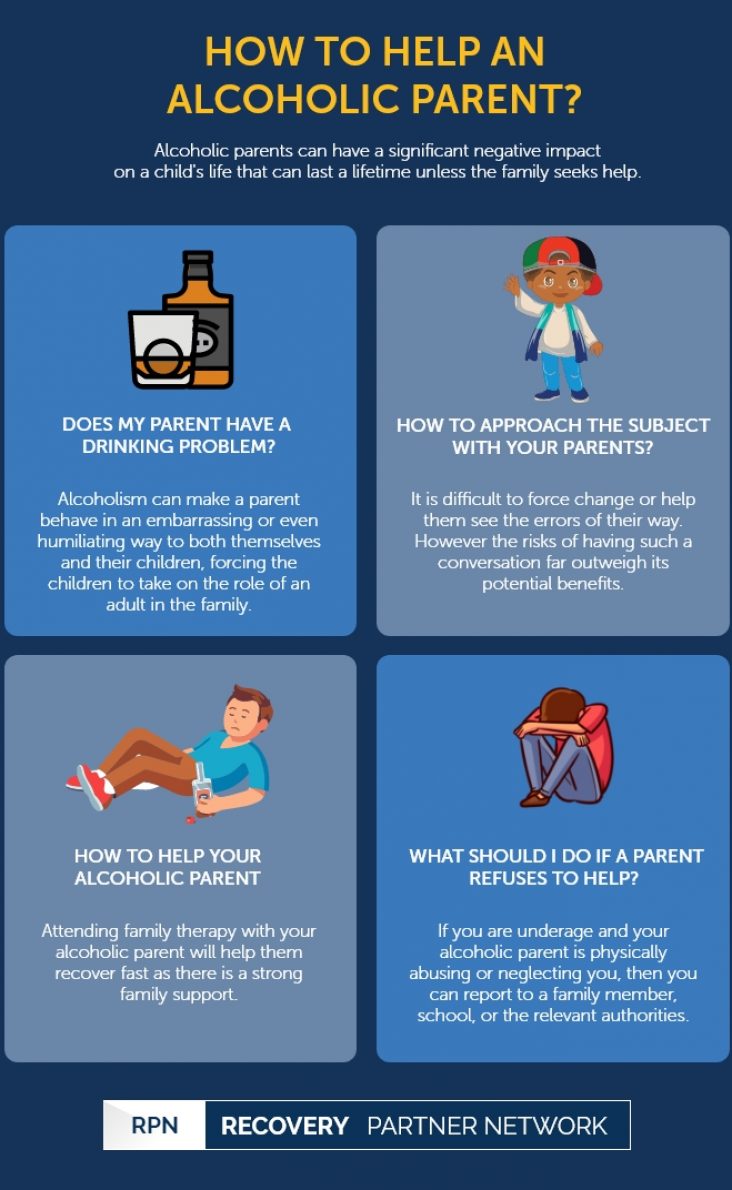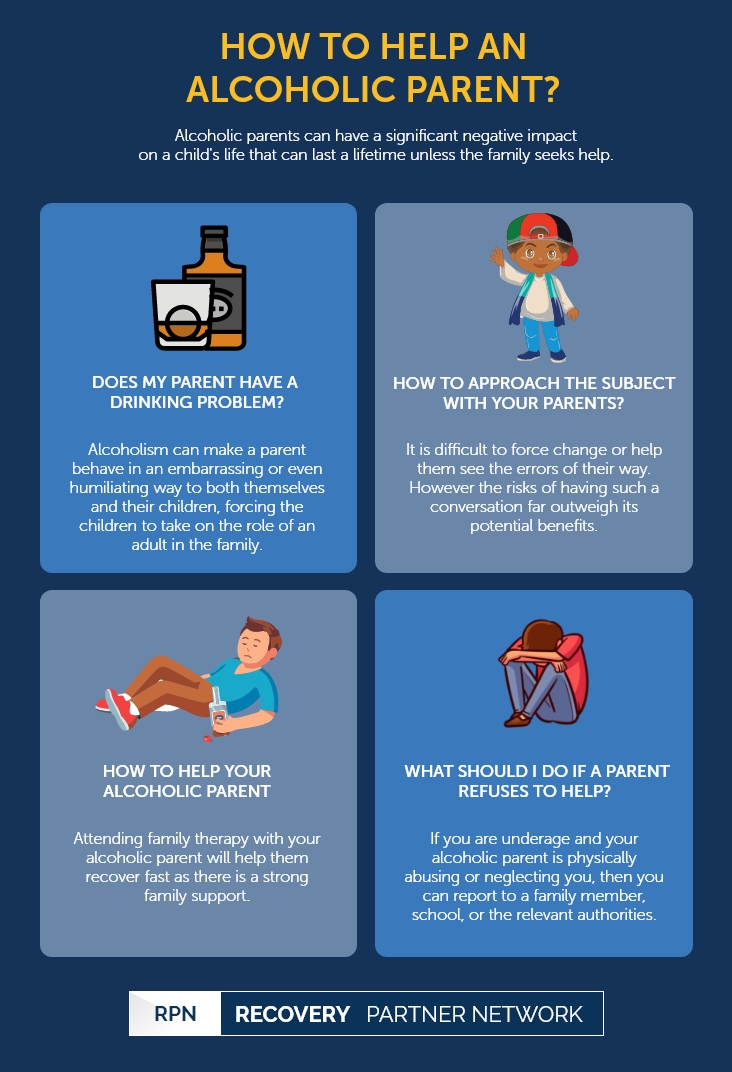Alcoholic parents can have a significant negative impact on a child’s life that can last a lifetime unless the family seeks help.
How to Help an Alcoholic Parent?
Parent alcoholism | Table of Contents
Does My Parent Have a Drinking Problem?
Alcohol use disorders, also known as alcoholism, affect around 17 million Americans, wreaking havoc on all aspects of their personal, professional, and social life. Sadly, alcoholism impacts not just the alcoholic but also those closest to them, especially children.
Alcoholism can result in the emotional, physical, and financial abuse and neglect of children of all ages, particularly those who still live with their alcoholic parents. Alcoholism can also make a parent behave in an embarrassing or even humiliating way to both themselves and their children. Even if it does not result in severe harm or distress, it often causes children to feel unloved, unimportant, and less confident.
Children of alcoholic parents are most often forced to take on the role of an adult in the family, causing them to grow up much faster than they should. This leads children to grow up angry, bitter, and resentful with their parents and life in general.
These children often feel guilty and blame themselves for not doing more for their parents. This is especially true for children who are constantly blamed by their parents for their state and fate of life. Although a child is never to blame for the actions and choices of alcoholic parents, this overwhelming burden is carried through by children for the rest of their lives.
Some children have had to deal with their parents’ alcoholism since they were born, while others deal with later on in life. Nevertheless, this pattern is getting increasingly common as alcoholism has turned into a growing epidemic amongst seniors.
FAQ
- How does a parent's drinking affect the child?
- What are the four types of child neglect?
- Why should you not drink in front of your child?
- What are the characteristics of a child of an alcoholic?
- What is fetal alcohol syndrome?
Children growing up with alcoholic parents are generally subjected to abuse, violence, or neglect, which causes psychological issues as they grow older. They are also highly likely to abuse alcohol themselves as they grow up.
Child neglect experienced by children of alcoholic parents includes physical neglect, medical neglect, educational neglect, and emotional neglect.
Children generally mimic the actions and habits of their parents, and thus drinking in front of your child can cause your child to form an unhealthy relationship with alcohol as they grow older.
Children of alcoholics exhibit symptoms or characteristics of loneliness, depression, anxiety, inability to sustain relationships, and an untrusting nature of everyone around them.
Fetal alcohol syndrome is a health condition in children caused by alcohol exposure during pregnancy. This condition causes brain damage and problems with growth that are irreversible.
Signs of Alcoholism
Alcohol abuse affects everyone differently. Certain alcoholics display many signs of alcoholism, while others display only a few (this is particularly true for high-functioning alcoholics). However, the below-mentioned signs are quite common to most alcoholics.
- Blackouts and memory loss
- Irritability and mood swings
- Frequent hangovers
- Changes in appearance, behavior, and social circle
- Making excuses for drinking and inappropriate behavior
- Prioritizing drinking over other obligations
- Staying isolated from friends and family
- Finding difficulties at work or with finances
- Drinking alone or secretly
How to Approach the Subject with Your Parents?
It is quite difficult to force change or help them see the errors of their way in someone who abuses alcohol. If you are worried that your parent has a drinking problem, you might be terrified of speaking to them about it. You might fear that they will get angry, violent, make a scene in front of others, embarrass you, move out, or use alcohol more secretly. Although these instances are a possibility, it is still worth trying.
Below is a list of guidelines that may help you improve the outcome of addressing the issue. Unless violence is a concern, the risks of having such a conversation far outweigh its potential benefits. However, if your parent is prone to violence, it is always best to have someone with you while having the conversation.
- Remember that the objective of the conversation is not to make your parents feel judged but to help them understand your concerns.
- Initiate the conversation only when your parent is sober.
- Do not initiate the conversation when you are under the influence.
- Unless violence is an issue, try to establish a time to have the conversation on a one-on-one basis with just the two of you.
- Begin the conversation by making it clear that you are doing it only because you care about them.
- Emphasize throughout the conversation that you are only having this conversation because you are concerned about their wellbeing.
- Always talk from your perspective and not in general, ”I have noticed that your behavior is different. I am worried about how much you are drinking. I think you are putting yourself in danger.”
- Point out the behaviors and incidents that you have observed and why/how they concern you.
- If you feel like it may benefit the conversation, talk about how their behaviors have impacted or hurt you
- Ensure that the conversation is two-way so that they do not feel cornered. An excellent way to achieve this is to ask open-ended questions.
- Stick to the main point. Don’t get distracted with speculation, judgment, or an explanation for why.
- If the parent still denies having a problem, try to get them to agree to have another conversation in the future.
How to Help Your Alcoholic Parent
Once your parents have decided to pursue treatment for their alcohol addiction, it is crucial to be honest with your self and your parents if they slip up. The National Institute of Alcohol Abuse and Alcoholism (NIAAA) says that it is quite common for the family of alcoholics to make excuses if they suffer a relapse or continue drinking. By making excuses or covering up your parents‘ relapses, you are unintentionally allowing them to continue drinking without any consequences. Thus, you should set boundaries and be honest with the treatment professionals whenever your parents relapse.
One of the biggest demons for a recovering alcoholic is boredom. Since alcohol was once a huge part of their lives, it can be quite difficult to fill its place when one starts treatment. Thus, take this into consideration and try to always keep your parents busy. Take them out very often to places where alcohol is not readily available. You should also encourage them to take up a new hobby or interest to keep their minds off alcohol.
Alcohol affects not just the alcoholic but also the members of the family, and thus treatment must be received by all those affected. A vital aspect of a prolonged recovery is to have strong family support. Unless the family addresses their personal issues honestly and openly, it can be difficult to move forward or provide the support the recovering patient needs
What Should I Do If a Parent Refuses Help?
Unfortunately, there is not much to do if your parent refuses help. If you are underage and your alcoholic parent is physically abusing or neglecting you, then you can report to a family member, school, or the relevant authorities. You can also seek the help of friends, extended family, professional interventionists, medical professionals, clergy, or other professionals to convince your parent to pursue treatment.
However, just because your parent refuses help does not mean that you cannot take measures to improve your own emotional and physical wellbeing. There are many support groups and resources out there that are dedicated to helping children and other family members of alcoholics by offering emotional support, college scholarships, counseling, and guidance to help them get through this ordeal and succeed in life.
What are the Resources Available to Me?
This is the largest and most popular support group for families of alcoholics. Al-Anon is structured after Alcoholics Anonymous (AA). This program comprises of a 12-Step program to help members handle alcoholism within the family. Al-Anon conducts regular meetings in all 50 states in America and many countries around the world.
Modeled after Al-Anon, Nar-Anon is complementary to Narcotics Anonymous (NA). Although Nar-Anon is mainly dedicated to helping those whose families have been impacted by drug use, it also extends support for family members who have been affected by alcoholism.
Regarded as one of the leading alternatives to AA, this program is particularly popular among alcoholics who have issues with the spiritual emphasis of AA. Although SMART recovery mainly targets alcoholics, it also includes resources for the family and friends of alcoholics as well.
Co-Dependents Anonymous is a support group that is mainly focused on helping individuals who struggle with co-dependent relationships, including those who have been affected by alcohol and those who have not. Co-DA is a 12-step program in which members support each other to not just survive but also to thrive.
From elementary schools to universities, schools of all levels have various resources to help students deal with their parents’ substance abuse.
It can be beneficial to seek the help of a mental health professional such as a psychiatrist, psychologist, and social worker. These professionals may help you understand and cope with your parents’ situation while also improving your mental state over your parents’ alcoholism.
There are thousands of websites on the internet that focus on helping the families of alcoholics. Although some websites can be more helpful than others, most of them offer invaluable information, resources, and exposure to community members who provide immense support.
Recovery Partner Network
We aim to educate and empower. If you feel our library of resources does not cover your specific need, reach out to us, and we would be happy to help.
STATISTICS
© Copyright 2025


